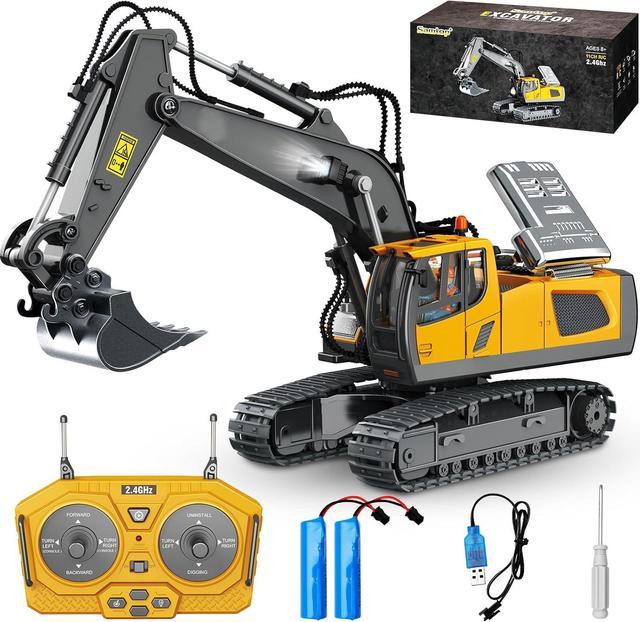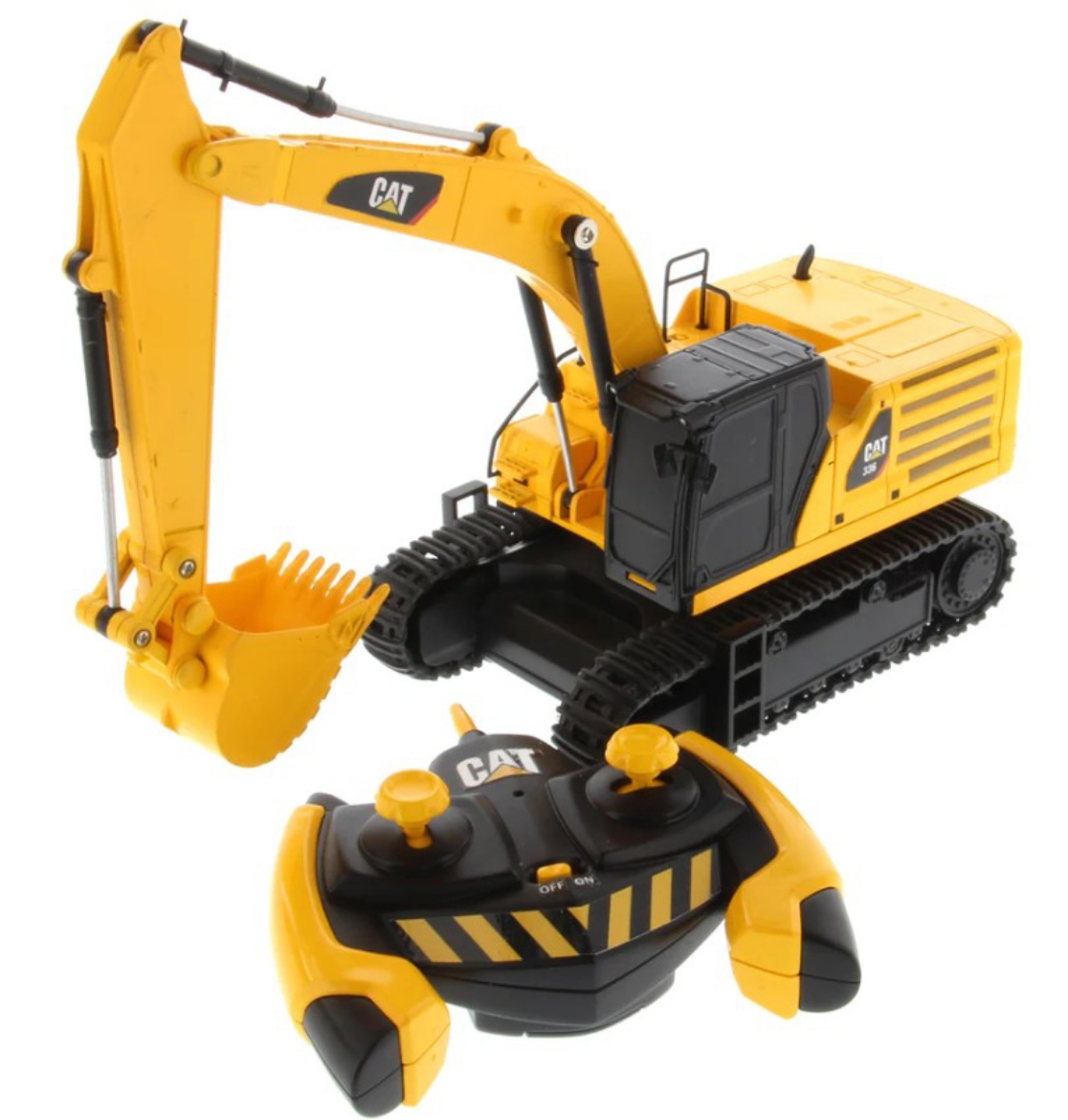Everything You Need to Understanding the Benefits of a rc excavator in Construction
Discover the Significance of Excavator in Modern Construction Projects
Excavators are essential tools in contemporary construction jobs. Their adaptability permits them to do a large range of jobs, from excavating and grading to demolition and website preparation. Advanced attributes, such as hydraulic accessories and general practitioners, improve their capacities and efficiency on task websites. As the market advances, the importance of excavators expands even a lot more. Recognizing their role can disclose understandings right into the future of building and construction practices. What lies ahead for these devices?
The Convenience of Excavators in Various Projects
Excavators are usually associated with large building jobs, their convenience permits them to be utilized in a broad range of applications, from property landscaping to utility upkeep. In metropolitan settings, excavators can navigate tight spaces to dig structures for homes or install drainage systems. Their capability to carry out fragile tasks makes them ideal for landscaping projects, where they can dig deep into for fish ponds or plant trees. Furthermore, excavators play a crucial duty in energy maintenance, successfully excavating trenches for pipes or wires without disrupting bordering locations. In agricultural applications, they assist in land clearing up and soil preparation. In addition, their versatility enables them to be equipped with numerous accessories, enhancing their performance across various jobs. This diverse nature of excavators not only simplifies various building and construction procedures but likewise demonstrates their integral function in contemporary framework growth and maintenance.
Secret Features and Types of Excavators
The conversation on essential attributes and sorts of excavators highlights the essential attributes that make these makers important in building and construction. Numerous excavator types, each developed for particular tasks, show their flexibility and effectiveness throughout various applications. rc excavator. Understanding these categories and features is important for optimizing their usage in contemporary building and construction tasks
Excavator Keys In Summary
Excavators play a critical function in modern construction, providing flexibility and efficiency across numerous tasks. These heavy equipment devices can be found in a number of kinds, each customized for specific applications. The most common types consist of spider excavators, recognized for their security on uneven surface, and rolled excavators, which give better flexibility on paved surface areas. Small excavators are favored for limited rooms and small tasks, while long-reach excavators are created for deep excavating. In addition, there are specialized excavators, such as hydraulic excavators, which enhance power and precision. Each kind features special capacities, making them vital for tasks varying from digging and grading to demolition and material handling. Understanding these variations permits building and construction specialists to choose the best excavator for their project requires.
Secret Features Explained
Understanding the key attributes of excavators improves their efficient application in building jobs. Excavators are characterized by their powerful hydraulic systems, which offer the required force for digging, lifting, and moving materials. Their verbalized arms enable a wide variety of motion, helping with precise procedures in confined areas. Additionally, the variety of accessories, such as buckets, grapples, and augers, increases their adaptability to satisfy different task demands. The dimension and weight of excavators also add to their security and maneuverability on various surfaces. Additionally, advancements in modern technology have brought about the combination of GPS and automation, enhancing precision and efficiency in excavation jobs. These features jointly position excavators as crucial tools in contemporary building and construction.
Applications in Building
Changing building and construction sites, excavators play an essential duty throughout various applications, ranging from domestic structure tasks to massive framework growths. These functional equipments are geared up for jobs such as excavating foundations, trenching for utilities, and site grading. Various sorts of excavators, including spider, rolled, and mini excavators, provide particular benefits customized to the task needs. Crawler excavators succeed in harsh terrains, while rolled excavators supply wheelchair on smooth surface areas. Miniature excavators are optimal for restricted areas, making them popular in metropolitan setups. The efficiency and power of excavators considerably accelerate building and construction processes, making sure prompt task completion. Their versatility additionally improves their value, allowing building teams to deal with a diverse variety of difficulties efficiently.
Enhancing Performance and Performance on Work Sites
Making best use of performance and efficiency on task sites is a critical purpose in modern construction. Excavators play a pivotal role in attaining this goal by simplifying numerous jobs. Their capability to perform numerous features-- such as digging, training, and grading-- decreases the need for added equipment, thereby conserving time and resources.Moreover, excavators improve process by permitting faster conclusion of jobs. With advanced functions like hydraulic accessories and general practitioners innovation, they can carry out exact operations that lessen errors and revamp. This accuracy not only improves the high quality of work however also maximizes material use, adding to cost savings.The flexibility of excavators allows them to adjust to various site problems, making sure that jobs progress smoothly no matter challenges. By incorporating excavators into building and construction processes, groups can significantly enhance their general performance, causing timely task completion and boosted success.
Security Advantages of Utilizing Excavators
Excavators considerably improve safety and security on building and construction websites with boosted driver exposure and lowered manual work dangers. By providing operators with a clear sight of their environments, excavators help to stop accidents and injuries. Furthermore, the equipment reduces the need for workers to engage in dangerous hands-on jobs, additionally advertising a more secure job atmosphere.
Improved Driver Exposure
Building and construction sites can be disorderly and loaded with potential dangers, boosted operator exposure plays a necessary duty in ensuring safety and security when utilizing excavators. Modern excavators are developed with large, unobstructed home windows and tactically positioned mirrors, permitting operators to maintain a clear sight of their environments (rc excavator). This enhanced exposure is crucial for spotting pedestrians, various other equipment, and different obstacles, substantially minimizing the danger of accidents. In addition, many excavators include innovative innovation, such as sensors and cameras, to provide operators with added perspectives, further improving awareness. The capacity to see more clearly not just aids in reliable operation yet likewise promotes a more secure workplace, making it much easier for drivers to navigate complicated building and construction websites without compromising security criteria
Reduced Manual Work Threats
When manual work is lowered via making use of excavators, various safety and security benefits emerge, noticeably enhancing the wellness of building and construction employees. Excavators lessen the physical strain related to heavy training and recurring tasks, successfully decreasing the threat of bone and joint injuries. By automating procedures see this such as digging, grading, and moving products, they allow workers to keep a safer distance from prospective dangers. Additionally, excavators are furnished with innovative safety and security attributes, such you could check here as rollover security systems and improved driver comfort designs, which further guard workers on website. The result is a considerable decrease in office crashes and injuries, resulting in enhanced productivity and morale amongst building teams. Inevitably, the adoption of excavators adds to a more secure and much more effective construction atmosphere.
Excavators in Earthmoving and Site Preparation
In modern-day building, a considerable section of earthmoving and site preparation tasks relies upon the effectiveness and convenience of excavators. These devices are designed to handle numerous soil kinds and terrain, making them crucial for rating, excavating, and trenching tasks. Their hydraulic arms can be equipped with various accessories, such as augers and containers, permitting drivers to tailor their strategy based upon particular project requirements.Excavators excel at moving large volumes of earth promptly and effectively, which accelerates the total building and construction timeline. They can navigate limited spaces and testing sites where typical devices may struggle, improving efficiency. Additionally, the precision of excavators warranties that website prep work complies with rigorous specifications, minimizing the risk of mistakes that can bring about expensive rework.
The Duty of Excavators in Demolition Tasks
Excavators play a crucial function in demolition jobs, as they possess the power and agility required to dismantle frameworks successfully. Outfitted with numerous attachments such as hydraulic breakers, shears, and grapples, these devices can adjust to different demolition needs, whether for small structures or huge commercial sites. Their convenience allows drivers to tackle complicated jobs while keeping safety and precision.In addition to their demolition abilities, excavators facilitate particles elimination, guaranteeing that work websites continue to be secure and organized. By breaking down structures into workable pieces, they permit structured clearing and recycling of materials, lining up with modern-day sustainability efforts.Moreover, excavators can access limited rooms and browse uneven terrain, making them essential in city demolition projects. In general, their robust style and multifunctionality make excavators a crucial asset in the demolition phase of building, adding considerably to job timelines and effectiveness.


Future Patterns in Excavator Innovation and Usage
As the building market develops, developments in excavator technology are positioned to change their use and effectiveness noticeably. One considerable trend is the assimilation of automation and man-made intelligence, permitting excavators to run with marginal human treatment. This shift will certainly improve accuracy in tasks such as grading and trenching, reducing human mistake and boosting productivity.Additionally, the rise of electric and hybrid excavators is shaping an extra sustainable building and construction atmosphere, lowering carbon exhausts and fuel expenses. Enhanced telematics systems are also arising, making it possible for real-time tracking of maker performance and maintenance demands, which can bring about better functional efficiency and longer devices lifespan.Moreover, innovations in accessory modern technology are increasing the versatility of excavators, allowing them to carry out a broader range of jobs. The mix of these patterns shows a future where excavators are smarter, greener, and more adaptable, ultimately improving construction task characteristics.
Frequently Asked Concerns
How Do Excavators Compare to Various Other Construction Equipment?
Excavators, identified by their flexibility and power, master excavating and earthmoving compared to other equipment. Their ability to do various jobs, consisting of training and demolition, makes them vital in building and construction projects, improving general effectiveness.

What Is the Average Lifespan of an Excavator?
The average life-span of an excavator usually ranges from 7,000 to 10,000 operating hours, relying on maintenance, usage problems, and design. Correct care can extend this life-span, ensuring peak performance throughout its operational years.
Just How Are Excavators Kept for Optimal Performance?
Excavators call for regular maintenance for peak performance, including regular inspections, liquid checks, filter replacements, and timely repair services. Carrying out a preventive maintenance schedule aids extend their life expectancy and assurances effective operation in various construction environments.
What Are the Expenses Connected With Renting Out vs. Purchasing an Excavator?
The costs connected with renting versus buying an excavator differ substantially. Renting offers lower upfront expenses however can gather over time, while buying calls for a substantial preliminary financial investment, however offers lasting financial savings and possession possession benefits.
What Training Is Needed to Run an Excavator?
Running an excavator needs specialized training, normally including security protocols, equipment procedure methods, and environmental awareness. Accreditation programs usually mandate sensible experience, allowing operators to take care of different jobs effectively while making sure compliance with market regulations. The most typical types include crawler excavators, recognized for their security on irregular surface, and rolled excavators, which supply higher movement on paved surfaces. Miniature excavators are preferred for tight rooms and small jobs, while long-reach excavators are created for deep excavating. Additionally, there are specific excavators, such as hydraulic excavators, which boost power and accuracy. Different kinds of excavators, including spider, rolled, and mini excavators, offer certain advantages tailored to the job needs. Spider excavators stand out in harsh terrains, while wheeled excavators use movement like it on paved surface areas.